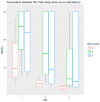Grumpy Dogs Are Smart Learners-The Association between Dog-Owner Relationship and Dogs' Performance in a Social Learning Task
- PMID: 33808379
- PMCID: PMC8066820
- DOI: 10.3390/ani11040961
Grumpy Dogs Are Smart Learners-The Association between Dog-Owner Relationship and Dogs' Performance in a Social Learning Task
Abstract
We investigated how dog-owner relationship-with a focus on possible behavioural problems-might associate with the individual variability in dogs' social learning performance. Dog owners first completed a questionnaire about their relationship with their dogs (N = 98). Then, dogs were tested in a detour test: a control group without demonstration, a group where the owner demonstrated the task and another group where the experimenter demonstrated the task. Finally, the dogs participated in two behaviour tests measuring their tractability and possessiveness. The two principal components from the questionnaire (called "overactive" and "irritable") did not show significant association with dogs' detour performance in the control group. "irritable" dogs performed better in the unfamiliar demonstrator group. These more persistent, goal-oriented dogs also looked back less at their owners during the detour. In the individual problem-solving context, the factor "overactive" had a similar effect on looking back at the owner, suggesting that the items of this component primarily are not connected to the dog-human relationship. Our results indicate that dog-human relationship has an integral role in the complex social behaviour of dogs, which warrants for the need of further empirical testing of the associations between social dynamics in dogs and their relationship with humans, including problem behaviours.
Keywords: detour test; dog; dog–owner relationship; social learning.
Conflict of interest statement
The authors declare no conflict of interest.
Figures






References
-
- Thalmann O., Perri A.R. Paleogenomic Inferences of Dog Domestication. Springer; Berlin/Heidelberg, Germany: 2018. pp. 273–306.
-
- Marshall-Pescini S., Cafazzo S., Virányi Z., Range F. Integrating social ecology in explanations of wolf–dog behavioral differences. Curr. Opin. Behav. Sci. 2017;16:80–86. doi: 10.1016/j.cobeha.2017.05.002. - DOI
LinkOut - more resources
Full Text Sources
Other Literature Sources

